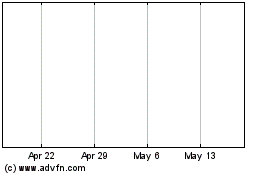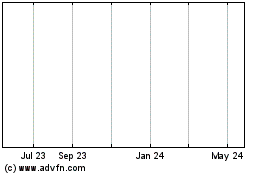Deal for Anadarko's African natural-gas assets part of a move
away from crude
By Neanda Salvaterra
This article is being republished as part of our daily
reproduction of WSJ.com articles that also appeared in the U.S.
print edition of The Wall Street Journal (May 13, 2019).
Total SA's deal to buy Anadarko Petroleum Corp.'s assets in
Africa cements the French oil major's position as the world's
second-largest provider of liquefied natural gas while pushing its
business deeper into dangerous parts of the world.
Total said earlier this week that it agreed to buy Anadarko's
African assets for $8.8 billion in a transaction that would help
Occidental Petroleum Corp. finance its takeover of the Texas-based
oil producer. The deal was a key part of Occidental's victory over
Chevron Corp. as the companies vied to buy Anadarko and its coveted
U.S. shale holdings.
If the sale goes through, Total will inherit projects across
Algeria, Ghana, Mozambique and South Africa containing 1.2 billion
barrels of oil-equivalent of proved and probable reserves, of which
70% is natural gas. The assets help Total gain ground on Royal
Dutch Shell PLC, the market leader in natural gas, and brings it
closer to its stated goal of becoming a cleaner company with a
portfolio that contains more natural gas than crude.
The Paris-based oil firm has completed a series of deals in
recent years, including the purchase of French utility Engie SA's
liquefied natural-gas business in 2017. Before the Anadarko deal,
Total had about 10% of the liquefied natural-gas market, second to
Royal Dutch Shell, which holds about 20%, analysts said.
Total said the deal should be cash-flow positive from 2020, even
if benchmark oil prices fall below $50 a barrel, and the assets
should generate more than $1 billion a year in free cash flow from
2025.
"Natural gas is at the heart of Total's strategy," Total Chief
Executive Patrick Pouyanne said at a gas conference in Shanghai
last month. "We want to be integrated along the gas value chain to
take full advantage of this growing energy source and discover new
[liquefied natural gas] outlets."
Total has said it wants its portfolio to comprise 60% gas
holdings by 2035, up from roughly 50% in 2018.
The company and other oil giants are moving into natural gas as
oil consumption is expected to rise by 0.5% a year between now and
2040, according to consulting firm Wood Mackenzie, and some
forecasters say demand could stop growing altogether within the
next decade. As buyers pivot toward cleaner fuels, global demand
for natural gas is expected to rise by 1.6% annually from 2016 to
2022, according to the International Energy Agency.
Natural-gas projects, though, tend to deliver lower returns than
oil projects. The weighted average internal rate of return for
liquefied natural-gas projects in the pipeline is about 13%,
compared with 20% for deep-water projects and 51% for
unconventional oil developments like shale, according to Wood
Mackenzie.
Historically, Total has shown a higher tolerance than its peers
for doing business in dangerous places. Still, taking over
Anadarko's assets in Africa presents challenges for the
company.
In a series of raids in February, insurgents in Mozambique
attacked an Anadarko convoy in an area near the company's
natural-gas development. The company placed its
project-construction site on lockdown, and one Anadarko contractor
was killed in the raids.
Total has joined with Algeria's government on oil-and-gas
projects since the 1950s, but recent political turmoil in the
country -- Africa's largest producer of natural gas -- delayed the
progress of some new gas agreements, including deals with Anadarko
and Exxon Mobil Corp.
Anadarko's Mozambique assets would give Total a big boost in the
gas business. The region is home to one of the world's largest
natural-gas deposits, just ahead of Egypt's giant Zohr offshore
field.
Anadarko has been developing a liquefied natural-gas project off
Mozambique's coast, which was expected to start producing in 2024.
Total said it would inherit 26.5% participating interest and
operator status in the Mozambique project, which represents 2
billion barrels of oil equivalent of long-term natural-gas
resources.
"This Mozambique asset will be producing for decades, that
positions Total in LNG into the middle of the century," said Stuart
Joyner, an energy specialist at the research firm Redburn
Partners.
Total's deal occurs as the major oil companies are under
increasing pressure from policy makers and activist investors to
comply with the 2015 Paris climate accord and lower global carbon
emissions from fossil fuels, which have been linked to rising
global temperatures.
A group of more than 4,500 shareholders working under the
auspices of the Netherlands-based group Follow This have been
pushing Royal Dutch Shell, BP PLC, Exxon Mobil, Chevron and Equinor
ASA to set and publish emissions targets that are aligned with the
goals of the climate agreement.
Total so far hasn't been presented with a shareholder resolution
to lower its carbon footprint, but the company is trying to get
ahead of the curve, analysts say.
"This is all part of [Total's] broader strategic aim to shift
towards a low carbon energy future," said Valentina Kretzschmar, a
director at Wood Mackenzie.
Write to Neanda Salvaterra at neanda.salvaterra@wsj.com
(END) Dow Jones Newswires
May 13, 2019 02:47 ET (06:47 GMT)
Copyright (c) 2019 Dow Jones & Company, Inc.
Shell (NYSE:RDSB)
Historical Stock Chart
From Dec 2024 to Jan 2025

Shell (NYSE:RDSB)
Historical Stock Chart
From Jan 2024 to Jan 2025
